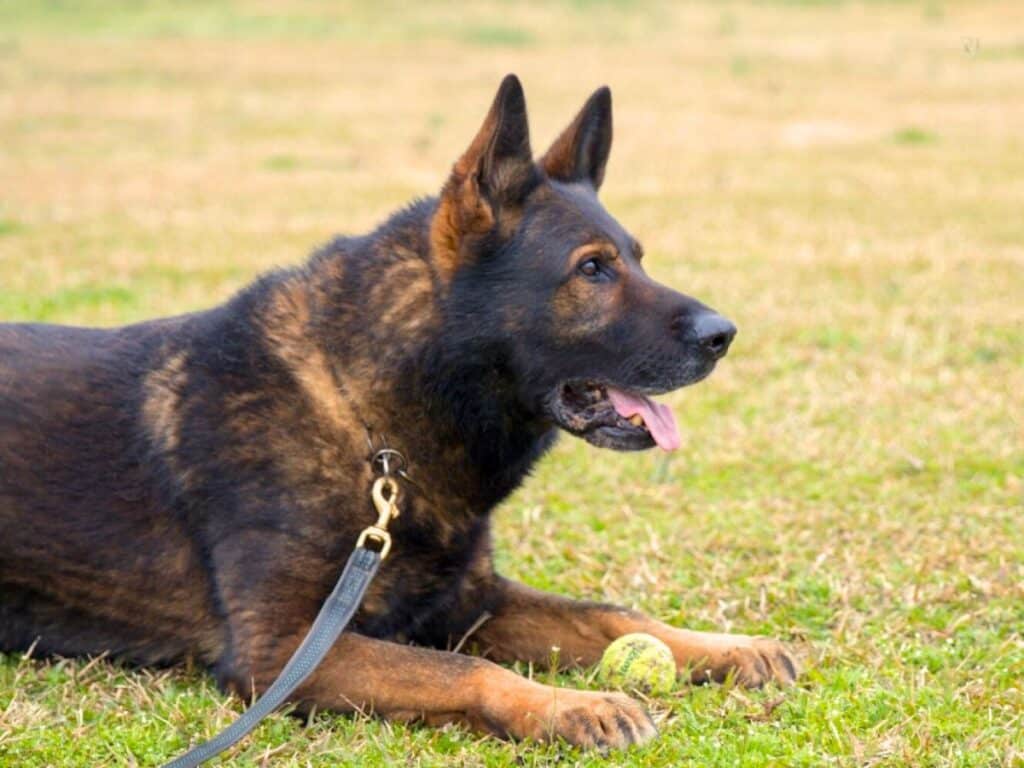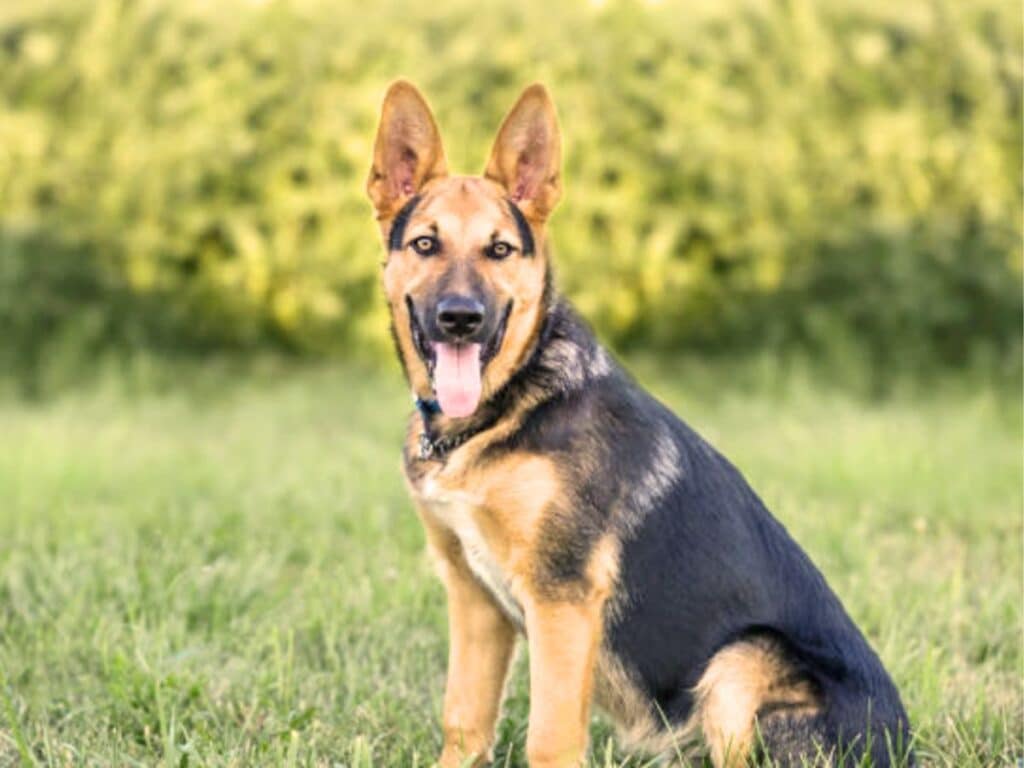German Shepherd’s boundless energy and strong attachment to their human companions often raise an essential question: Can German Shepherds be left alone?
Finding the right balance between socialization and independence is crucial for their well-being.
If you’re a dog owner wondering if your German Shepherd can handle being home alone, stay tuned! We will delve into the importance of providing them with mental and physical stimulation to prevent boredom and anxiety when left alone.
Can German Shepherds Be Left Alone?
German Shepherds can be left alone for a period of 4 to 6 hours maximum. However, it’s crucial to consider their age, exercise needs, and training. Puppies require more attention and shouldn’t be left alone for long periods.
Adult German Shepherds can handle being alone for several hours, but it’s essential to provide them with adequate exercise, mental stimulation, and a comfortable environment.
Proper training and gradual desensitization to alone time are key to preventing separation anxiety. If you need to leave your German Shepherd for extended periods, consider enlisting the help of a dog sitter or daycare to ensure their well-being and companionship.
RELATED: What To Do With German Shepherd While at Work?

How Long Can German Shepherds Be Left Alone?
Healthy adult German Shepherds can typically be left alone for around 4 to 6 hours at a time. Puppies and younger dogs may need more frequent breaks, so you have to check on them once every 1-2 hours. Senior dogs, however, may begin to need more bathroom breaks every 2 -3 hours.
Puppies require more frequent breaks due to their higher energy levels and need for socialization and training. Adolescent and adult German Shepherds can handle longer periods alone, but it’s essential to provide exercise and mental stimulation.
Senior dogs may need more frequent attention and shorter alone times, especially if they have health issues or mobility problems.
RELATED: German Shepherd Health Issues: Symptoms & Treatments
Here’s a table with general recommendations for how long you can leave your German Shepherd dog alone at different life stages:
| Age of the German Shepherd | Recommended Alone Time |
| Newborns | Not recommended to be left alone |
| Puppies (8 -12 weeks) | 1 – 2 hours (maximum) |
| Adolescents (2 – 4 months) | 2 – 4 hours |
| Adults (6 months and above) | 4 – 6 hours |
| Senior dogs ( 8 years and above) | 2 – 3 hours or less |
Please note that these are approximate guidelines, and individual needs can vary. Always assess your dog’s specific requirements and adjust accordingly to ensure their well-being.
RELATED
What happens when you leave your German Shepherd alone?

Dogs are social animals, and prolonged solitude can result in feelings of loneliness, boredom, and frustration. Here are some consequences to consider when leaving your German Shepherd alone for long periods:
1. Relaxation: Some GSDs are quite content being alone and will relax or sleep during your absence. They may not show any signs of stress or anxiety.
2. Boredom: Without stimulation or activities, a German Shepherd may become bored, leading to restlessness. They might resort to chewing on objects or furniture to alleviate their boredom.
3. Separation anxiety: GSDs are known to form strong bonds with their owners. Separation anxiety can occur, leading to behaviors like excessive barking, whining, pacing, or destructive actions as they express their distress.
4. Potty accidents: If your GSD hasn’t been properly housetrained or doesn’t have access to a designated potty area, they may have accidents indoors, especially if you’re away for an extended period.
RELATED: How To Potty Train a German Shepherd Puppy
5. Excessive vocalization: Some German Shepherds can become vocal when left alone. They may bark or howl to communicate their discomfort or to alert you to their presence.
RELATED: Why Are German Shepherds So Dramatic?

6. Escape attempts: In rare cases, if a GSD becomes extremely anxious or frustrated, they may attempt to escape from the area you’ve confined them in, which can lead to potential injury.
7. Depression: Prolonged periods of isolation can lead to depression in German Shepherds, with symptoms like decreased appetite, lethargy, and a loss of interest in activities.
8. Physical health issues: If left alone for extended periods without the opportunity for exercise and bathroom breaks, your GSD’s physical health may be affected. Lack of movement and holding in urine or feces can lead to discomfort and potential health problems.
It’s essential to consider these potential outcomes and take steps to create a safe, engaging, and comfortable environment for your German Shepherd when you need to leave them alone. Understanding your dog’s individual needs and providing appropriate training and stimuli can make a significant difference in how they respond to being left alone.
Tips For Leaving Your German Shepherd Alone
Leaving your German Shepherd alone at home can be a challenging task, but with the right strategies in place, you can ensure their safety and comfort.
Here are some considerations to keep in mind when creating a suitable environment for your furry friend both inside the house.
1. Dog-proof your space: Start by dog-proofing your home. Remove any potential hazards like toxic plants, chemicals, small objects, or electrical cords that your GSD might chew on. Secure trash cans with lids to prevent them from digging through garbage.
2. Create a designated area: Set up a safe and comfortable area for your pup. A spacious crate or a designated room with a sturdy dog gate can work well. Ensure this space is well-ventilated, well-lit, and away from drafts or direct sunlight.
RELATED: How to Crate Train a German Shepherd Puppy?

3. Provide toys and chews: German Shepherds are intelligent dogs that require mental stimulation. Supply them with toys and chews to keep them entertained while you’re away. Puzzle toys and durable chew toys can help prevent boredom.
4. Establish a routine: Dogs thrive on routines. Try to keep a consistent schedule for feeding, potty breaks, and playtime. This helps your GSD anticipate when to expect your return.
5. Exercise before leaving: Ensure your dog gets sufficient exercise before you leave. A tired dog is less likely to become anxious or destructive. A long walk or vigorous play session can be beneficial.
RELATED: How Much Exercise Does a German Shepherd Need Daily?
6. Access to water: It’s essential to provide fresh water for your dog at all times, especially when leaving them outside. Consider using an automatic water dispenser or ensuring that the water bowl is filled before you leave.
7. Avoid chaining: Chaining your German Shepherd for long periods can lead to frustration and anxiety. Instead, allow them freedom of movement within the confines of a secure outdoor space.
8. Consider a dog sitter or walker: If your schedule permits, you might consider hiring a dog sitter or walker to break up your GSD’s alone time. Regular breaks can reduce anxiety and provide social interaction.
9. Use positive reinforcement: Reward your GSD with treats and praise when they behave well while alone. This positive reinforcement helps them associate your absence with positive experiences.
10. Desensitize to departures: Gradually increase the time you spend away from your pup. Start with short departures and gradually extend them, so your dog becomes accustomed to your absence.
11. Avoid excessive goodbyes: Keep your departures low-key. Excessive goodbyes can increase separation anxiety. Likewise, when you return home, wait a few minutes before greeting your GSD to prevent overexcitement.
12. Monitor with a camera: Use a pet camera or security camera to keep an eye on your GSD when you’re not at home. This allows you to check in on them and ensure their safety.

13. Get another dog: You may also consider getting another dog to give company to your GSD when you’re away from home. This will ensure that both the dogs have each other to support in case either one of them starts getting anxious.
By following these steps and creating a safe, stimulating, and consistent environment, you can help your German Shepherd feel secure and content when left alone at home.
Conclusion
In conclusion, the question of whether German Shepherds can be left alone comes down to understanding and meeting their unique needs. These remarkable dogs are indeed capable of spending some time alone, independently managing themselves in the absence of their owners. However, it’s crucial to create a safe, comfortable, and engaging environment for them during these times. With patience, training, and a lot of love, you can ensure that your German Shepherd is not just left alone but left content and secure in your absence.
Frequently Asked Questions (FAQs)
1. Can I leave my German Shepherd alone overnight?
Leaving your German Shepherd alone overnight is generally not recommended. Dogs are social creatures that thrive on human interaction and may feel anxious or lonely if left by themselves for an entire night. It’s best to arrange for someone trustworthy to stay with them or consider boarding them at a reputable facility where they can receive proper care and attention.
2. Can I leave my German Shepherd outside while I’m away?
Leaving your German Shepherd outside while you’re away should be approached with caution. While some dogs may enjoy spending time outdoors, it’s crucial to ensure they have access to shelter from extreme weather conditions and are in a secure and safe environment. Provide them with plenty of water and toys to keep them entertained during their outdoor alone time.
3. Should I crate my German Shepherd when leaving them alone?
Crate training can be an effective way to provide a safe space for your German Shepherd when left alone. However, it’s important to introduce the crate gradually and make it a positive experience for your dog. Never use the crate as a form of punishment or leave your dog crated for extended periods without breaks.
4. How can I help my German Shepherd adjust to being left alone?
To help your German Shepherd adjust to being left alone, start by leaving them for short durations and gradually increasing the time apart. Create a positive association by giving them treats or toys before leaving and upon returning home. Provide mental stimulation through puzzle toys or interactive feeders while you’re away.
FURTHER READING:




